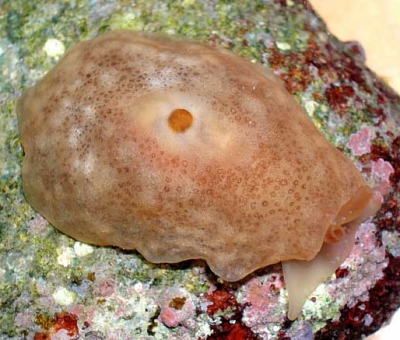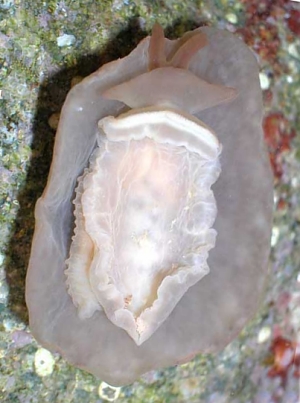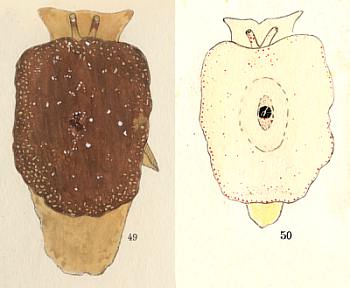
Pleurobranchus caledonicus
Risbec, 1928
Order: NOTASPIDEA
Family: Pleurobranchidae
DISTRIBUTION
Described from New Caledonia. Records on Forum from Okinawa, Marshall Ids, Hawaii and sthn Queensland, Australia.
PHOTO
Locality: Old Woman Island, Mooloolaba, Sunshine Coast, 12 m, Queensland, Australia, Pacific Ocean, 08 May 2004, Subtidal. Length: 40 mm. Photographer: Gary Cobb.
Pleurobranchus caledonicus was described by Risbec (1928) from three 50 mm long animals he collected from under a block of dead coral at Noumea, New Caledonia. To my knowledge this species has not been rediscovered until this report from Gary Cobb from southern Queensland. Risbec describes the mantle as deep yellowish with maroon brown patching. The most distinctive feature was a small hole in the centre of the mantle surrounded by a 'clair' ring. I presume the 'clair' can be translated as meaning 'colourless'. As Risbec had three animals, all presumably with this hole, it is unlikely that the hole was a developmental fault or the result of damage to the mantle.
Other points of interest in Risbec's description are that the internal shell is approx 18 mm in length and covers the digestive gland and reproductive organs; the radular teeth lack denticles; and that the jaw elements are cruciform, and lack denticles except for a terminal pair, similar to those seen in Berthella martensi. Gary Cobb's animal fits Risbec's description rather well.
One question we can't answer at present is whether this is really a species of Pleurobranchus? There are not that many characters which conclusively differentiate Pleurobranchus from Berthella, but one external feature is the way Pleurobranchus has a deep cleft in the anterior mantle to acommodate the rhinophores. This is absent in Berthella and certainly not present in P. caledonicus. Internally, the blade of the jaw elements is edged with denticles in species of Pleurobranchus but can be present or absent in Berthella. The absence of denticles, as reported by Risbec, combined with the absence of an anterior mantle notch, would suggest that P. caledonicus is most likely to be a species of Berthella. However confirming the identification and its generic position must wait until the anatomy of this animal can be investigated.
It has many external similarities to the Atlantic species Berthella africana and was previously identified on the Forum as Berthella cf. africana.
-
Risbec, J. (1928) Etude anatomique des gastéropodes Tectibranches de la presqu'île de Nouméa, avec description de cinq espèces nouvelles. Archives du Museum d'Histoire naturelle, Paris, 3, 37-68.
Rudman, W.B., 2009 (January 12) Pleurobranchus caledonicus Risbec, 1928. [In] Sea Slug Forum. Australian Museum, Sydney. Available from http://www.seaslugforum.net/find/pleucale
Related messages
Re: Pleurobranchus caledonicus found in sthn Queens
January 15, 2009
From: Scott Johnson
Concerning message #22148:
Hi Bill,
Regarding Pleurobranchus caledonicus, I don't think the dark spot is a hole in the skin. I've been trying to find another specimen for a while for someone who wanted to examine it, but without success. I will take another look at the next one I find. But my notes on one of my earlier specimens says it is a "single oval, slightly depressed, dark brown spot."
Scott
uwkwaj@yahoo.com
Johnson, S., 2009 (Jan 15) Re: Pleurobranchus caledonicus found in sthn Queens. [Message in] Sea Slug Forum. Australian Museum, Sydney. Available from http://www.seaslugforum.net/find/22152Thanks Scott,
It will be interesting to find out if it is really a 'hole' reminiscent of the foramen found in some sea hares [see Aplysioidea mantle cavity] or a dark pigment spot.
Best wishes,
Bill Rudman
Re: Pleurobranchus caledonicus found in sthn Queens
January 13, 2009
From: Scott Johnson
Concerning message #22062:
Hi Bill,
Gary's photo of Pleurobranchus caledonicus looks a lot like what is on the Forum as Berthella cf africana.
Scott
uwkwaj@yahoo.com
Johnson, S., 2009 (Jan 13) Re: Pleurobranchus caledonicus found in sthn Queens. [Message in] Sea Slug Forum. Australian Museum, Sydney. Available from http://www.seaslugforum.net/find/22148Dear Scott,
I am glad someone is awake! I am not sure how I missed that but you are absolutely right. I have moved the messages concerning Berthella cf africana to the P. caledonicus page. Clearly Pleurobranchus caledonicus has a wide distribution in the tropical and subtropical Pacific. As I discuss on the Fact Sheet, your use of the genus Berthella is most probably correct but I would like some more anatomical information from Pacific animals before changing its name. Can you recall if the brown mark in the middle of the mantle is a pigment mark or an actual hole in the skin?
This of course brings us back to Berthella africana. Is it just an Atlantic form? of the same species, or perhaps a geographic subspecies?
Best wishes,
Bill Rudman
Pleurobranchus caledonicus found in sthn Queensland
January 12, 2009
From: Gary Cobb


Hi Bill and everyone!
I see there is no entry for Pleurobranchus caledonicus. Here is a record of this rare find. The hole like dot in the center of the back is quite unique. Only one was ever found...still looking for the second one!
Locality: Old Woman Island, Mooloolaba, Sunshine Coast, 12 m, Queensland, Australia, Pacific Ocean, 08 May 2004, Subtidal. Length: 40 mm. Photographer: Gary Cobb.
Cheers
Gary
gary@www.nudibranch.com.au
Cobb, G.C., 2009 (Jan 12) Pleurobranchus caledonicus found in sthn Queensland. [Message in] Sea Slug Forum. Australian Museum, Sydney. Available from http://www.seaslugforum.net/find/22062
Dear Gary,
Thanks for this interesting find. It certainly fits Risbec's original description, and as he has 3 specimens it would seem the central hole is a 'normal' character not some developmental aberration or damage. I presume the brownish spot in the hole is the horny colour of the exposed internal shell.
As I discuss on the Fact Sheet, it is possible that this is a species of Berthella rather than a Pleurobranchus but I guess we will have to wait until another specimen is found and can be examined by a pleurobranch expert.
Best wishes,
Bill Rudman
Okinawa Berthella cf. africana
October 22, 2002
From: Bob Bolland


Note added 13 January 2009: This is Pleurobranchus caledonicus Risbec, 1928, which is most probably a species of Berthella.
Hi Bill,
Here are two images of an apparent undescribed Okinawa Berthella sp. having the dark brown patch in the center of the mantle, to add to the recent post of Berthella cf. africana.
RFB # 3007-B
Notum Length: 21mm
Collected from 5ft(1.5m) at Seragaki, Okinawa
15 Jun 1992
RFB # 3107-C
Notum Length: 30mm
Collected from 125ft(38m) at Seragaki, Okinawa
3 Jan 1993
Both of these were found beneath coral rubble during the daytime. In addition to the above two animals, Atsushi Ono (1999) has a similar, but bright red individual, pictured on p. 34 (as Pleurobranchidae sp.1) from the Kerama Islands, which are located 30 ~ 40km west of Okinawa's main island.
• Ono, Atsushi. 1999. Opisthobranchs of Kerama Islands, TBS-BRITANNICA & Co., Ltd., Japan. 184pp.
Cheers,
Bob
bollandr@rapid-link.ne.jp
Bolland, B., 2002 (Oct 22) Okinawa Berthella cf. africana. [Message in] Sea Slug Forum. Australian Museum, Sydney. Available from http://www.seaslugforum.net/find/8024Thanks Bob,
Bill Rudman
Re: Berthella cf. africana from the Marshall Islands
September 17, 2002
From: Juan Lucas Cervera
Note added 13 January 2009: This is Pleurobranchus caledonicus Risbec, 1928, which is most probably a species of Berthella.
Dear Bill and Scott,
Concerning Berthella cf. africana, it seems to me that a comparative study of material from Canary Islands, Hawaii and Marshall Islands is needed to determine whether they are all the same species. In my experience, internal anatomy can supply "surprises" that could help to decide about this matter. It is thought that the internal anatomy of Berthella is "more or less" well known, but that is not true. As an example, I (together with other colleagues) have noted that not all species of Berthella have the 'characteristic' well developed buccal acid gland.
Regards.
Lucas.
lucas.cervera@uca.es
Cervera, J.L., 2002 (Sep 17) Re: Berthella cf. africana from the Marshall Islands. [Message in] Sea Slug Forum. Australian Museum, Sydney. Available from http://www.seaslugforum.net/find/7969Dear Lucas,
Looking at the anatomy is obviously the next step.
Cheers,
Bill
Berthella cf. africana from the Marshall Islands
September 13, 2002
From: Scott Johnson

Note added 13 January 2009: This is Pleurobranchus caledonicus Risbec, 1928, which is most probably a species of Berthella.
Hi Bill,
Attached are three photos of a species of Berthella from the Marshall Ids to accompany those I sent from Hawaii. These three specimens ranged from 17mm (lower left) to 55mm (upper right).
Scott
johnson@kmr.ll.mit.edu


Thanks Scott,
They certainly look like the original paintings of the Atlantic species B. africana.
Bill Rudman
Berthella from Hawaii
September 13, 2002
From: Scott Johnson


Note added 13 January 2009: This is Pleurobranchus caledonicus Risbec, 1928, which is most probably a species of Berthella.
Hi Bill,
Erwin Koehler's photo of Berthella africana reminded me of this species from the Pacific. Here are two individuals from Hawaii. I will send separately some photos from the Marshall Islands. The animals are up to around 35mm in length (rarely larger) and are usually seen under rocks during the day or in ledges and caves at night, anywhere from about 5 to at least 20 meters deep.
Scott
johnson@kmr.ll.mit.edu
Johnson, S., 2002 (Sep 13) Berthella from Hawaii. [Message in] Sea Slug Forum. Australian Museum, Sydney. Available from http://www.seaslugforum.net/find/7898
Thanks Scott,
I can't find any reference to animals of this colour being previously found in the Pacific. As you say, they have remarkable similarities to Berthella africana. In particular they closely resemble the paintings in Pruvot-Fol's original description [copied alongside]. I don't know of any other species with that chracteristic dark brown patch in the centre of the mantle. It will be interesting to hear the views of the Berthella experts.
Best wishes,
Bill Rudman
